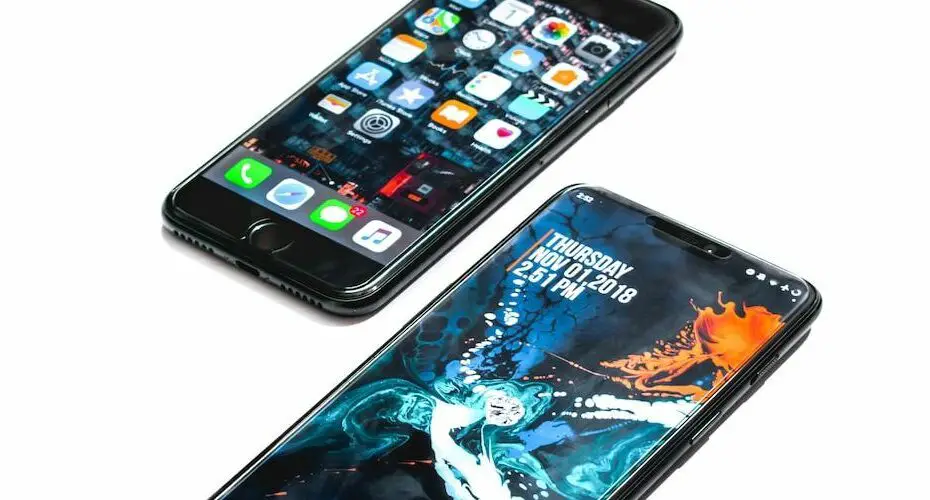Headphones usually leak sound because of two reasons. First, the seal between the ear cup and the headphone cable may not be perfect, leading to leakage. Second, the headphone jack may be loose or not properly seated, allowing sound to escape. If you are experiencing this problem, you can try re-seating the headphone jack or using a new headphone cable. If the problem persists, you may need to replace your headphones.
This is important
Headphones are designed to transmit sound to the user’s ears. However, if they are not properly sealed, air can leak in and cause the headphones to produce sound that is other than the audio that is being played. This is especially common with headphones that have a small opening for the ear canal. The pressure of the air inside the headphones can cause the earphones to loosen and eventually pop out. This can cause the headphones to leak sound, making it difficult to listen to the audio.
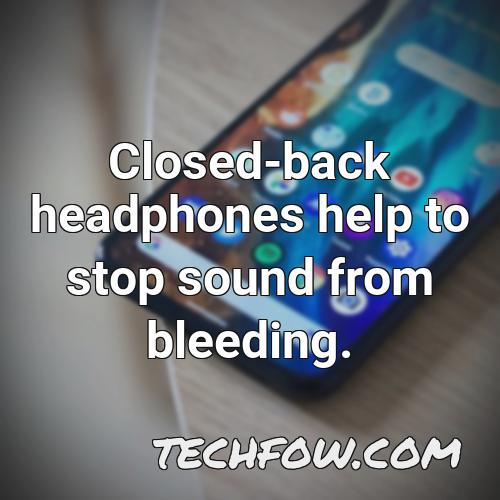
How Do I Stop My Headphones From Leaking Sound
If you are using earbuds that come with a case, make sure to keep the case closed all the time. This will help to prevent sound from leaking out and it will also help to keep your earbuds clean. If you are not using a case, you can try to cover your earbuds with your hands. This will help to prevent sound from leaking out, but it may be difficult to do if you are using earbuds that are large in size. If you are using earbuds that come with silicone tips, it is best to replace them with foam tips. Earbuds that come with foam tips will help to prevent sound from leaking out and they will also help to keep your earbuds clean. If you are using earbuds that are made out of bone conduction material, it is best to use noise-isolation earbuds. These earbuds will help to block out outside noise so that you can hear your music more clearly. If you are using earbuds that are designed for protection, it is best to use earmuffs. Earmuffs will help to protect your hearing from harmful noise levels. Finally, if you are listening to music on a regular basis and you want to reduce the risk of your earbuds leaking sound, you can try to turn your volume down.

Why Do My Headphones Make a Hissing Noise
Headphones are often a source of comfort and enjoyment for people. However, if the headphones are not properly connected, the sound can become distorted and uncomfortable to listen to. One common reason for this is when the headphones are not plugged into the correct audio source. When this happens, the headphones may produce a hissing or wheezing noise as the audio is distorted. Additionally, improper connections can also cause the headphones to stop working altogether. By understanding the common causes of headphone hissing and wheezing, users can take precautions to ensure that their headphones are always in good working order.
When headphones are not plugged into the correct audio source, the most common cause of hissing and wheezing is interference. This interference can come from a number of different sources, including electrical equipment and other electronic devices. When this interference is present, it can cause the audio signal sent to the headphones to be distorted. Additionally, this interference can cause the headphones to produce hissing and wheezing noises as the air inside the headphones is forced to move rapidly.
Another common cause of headphone hissing and wheezing is improper connections. This can happen anywhere on the headphones, from the audio cable to the headphones themselves. When this happens, the audio signal sent to the headphones can be distorted or lost altogether. Additionally, improper connections can cause the headphones to stop working altogether. By understanding the common causes of headphone hissing and wheezing, users can take precautions to ensure that their headphones are always in good working order. For example, it is important to check the connections regularly and to make sure that they are properly plugged into the audio source. Additionally, users may want to consider using headphones that are designed for extended use. These headphones are often built with more durable connections that are less likely to break or produce interference.

How Do You Stop a Sound From Bleeding
Closed-back headphones help to stop sound from bleeding. If a sound is bleed-throughed, it is heard through the headphones even if the person is not listening to the music. To prevent this, it is important to position instruments and sound sources strategically, and to position directional microphones strategically.
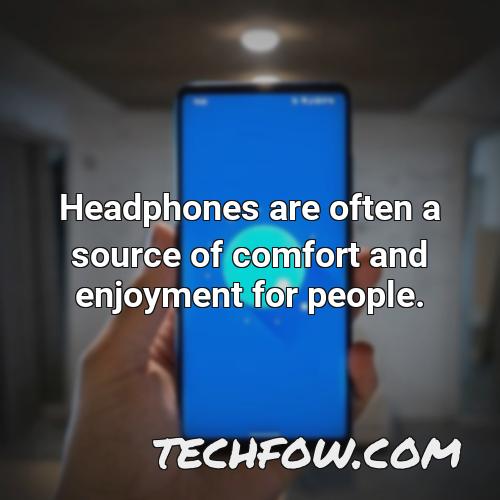
Why Do My Ears Leak When I Wear Headphones
When someone wears headphones, the air inside their ears is reduced. This can cause moisture and earwax to build up.
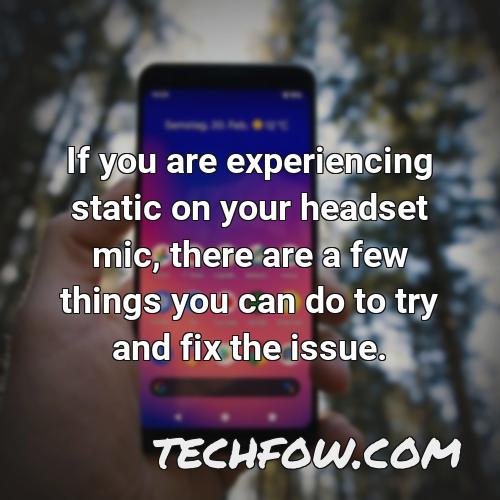
How Can I Make My Headphones Tighter
headphones are meant to comfortably fit over your ears, but sometimes they can become loose over time. There are a few ways to tighten the headphones and make them more comfortable to wear.
One way to tighten the headphones is to place them over something smaller than the headphones, like a stack of books. Then, using a cord or elastic band, you can squeeze the headphones inwards to make them tighter.
Another way to tighten the headphones is to put them over your ears, then insert a finger into the earpieces and twist. This will tighten the earpieces and make them more comfortable to wear.
If the headphones are not fitting well or are becoming loose, it is recommended that you replace them.
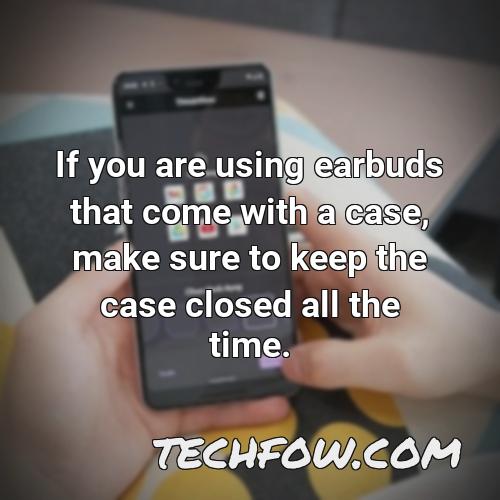
Why Are My Airpods Quiet but Loud Outside
When you first get your AirPods, make sure you set them up correctly. If you’re using an iPhone or Android phone, go to the Settings app and look for “AirPods” under “Bluetooth & wireless”. Tap on it, and then select “On”. If you’re using a Windows phone, you’ll need to go to the “Sound” app and look for “AirPods”. Tap on it, and then select “On”.
After you’ve set up your AirPods, make sure you adjust the volume. If you’re using an iPhone or Android phone, go to the Settings app and look for “AirPods” under “Sound”. Tap on it, and then select “Volume”. If you’re using a Windows phone, you’ll need to go to the “Sound” app and look for “Audio settings”. Tap on it, and then select “Volume”.
If you’re using an iPhone or Android phone, you can also adjust the equalizer. Go to the “Music” app and look for “AirPods”. Tap on it, and then select “Equalizer”. If you’re using a Windows phone, you’ll need to go to the “Audio settings” app and look for “Equalizer”. Tap on it, and then select “Equalizer”.

Do All Noise Cancelling Headphones Hiss
Generally speaking, the better the noise cancellation, the less it will add any hiss at all. Some people, however, may feel pressure inside their ears when using powerful ANC, so it is important to test out a pair of headphones before making a purchase.
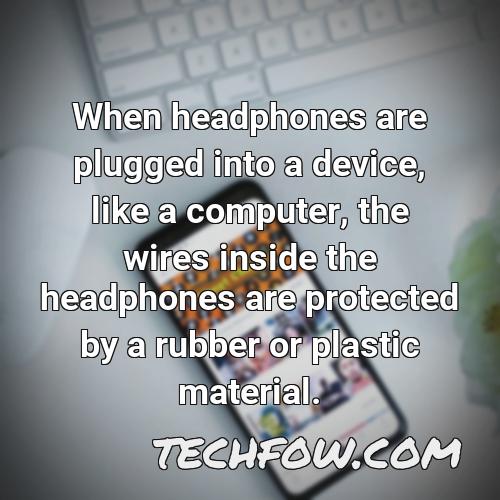
Why Do I Hear Crackling in My Headphones
When headphones are plugged into a device, like a computer, the wires inside the headphones are protected by a rubber or plastic material. This material covers the wires and keeps them from touching each other. Sometimes, the wires inside the headphones can become loose. This can cause the wires to touch each other, which can cause crackling in the audio.
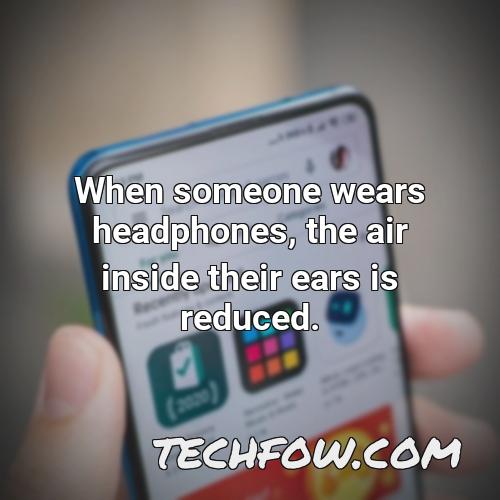
How Do I Get Rid of Static on My Headset Mic
If you are experiencing static on your headset mic, there are a few things you can do to try and fix the issue. One option is to try and plug your headset into a different USB port on your computer or mobile device. Another option is to disconnect your headset and microphone from your computer or mobile device, and then reconnect them. If possible, try using a different USB cable.

How Do You Know if Your Headphones Are Bleeding
If you are using headphones to listen to music or watch a movie, it’s important to make sure that the headphones are fitting properly and that the sound is not leaking out. To test for sound leakage, you can borrow your friend’s headphones and see how loud the music is with the volume turned up. If the music is too loud, then the headphones are likely leaking sound.
Closing notes
If you are experiencing sound leakage from your headphones, there are a few things you can try. First, make sure the seal between the ear cup and headphone cable is perfect. If that doesn’t solve the problem, try using a new headphone cable. If that still doesn’t solve the problem, your headphones may need to be replaced.

